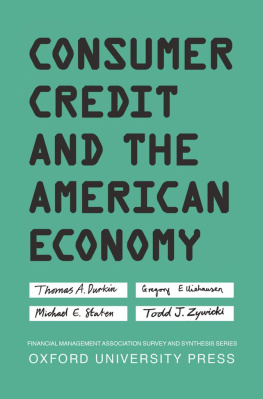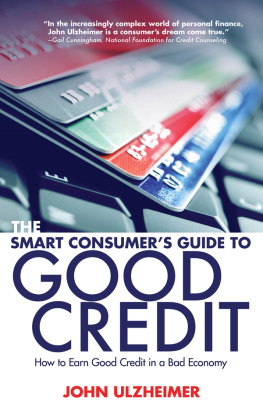Thomas A. Durkin - Consumer Credit and the American Economy
Here you can read online Thomas A. Durkin - Consumer Credit and the American Economy full text of the book (entire story) in english for free. Download pdf and epub, get meaning, cover and reviews about this ebook. year: 2014, publisher: Oxford University Press, genre: Home and family. Description of the work, (preface) as well as reviews are available. Best literature library LitArk.com created for fans of good reading and offers a wide selection of genres:
Romance novel
Science fiction
Adventure
Detective
Science
History
Home and family
Prose
Art
Politics
Computer
Non-fiction
Religion
Business
Children
Humor
Choose a favorite category and find really read worthwhile books. Enjoy immersion in the world of imagination, feel the emotions of the characters or learn something new for yourself, make an fascinating discovery.
- Book:Consumer Credit and the American Economy
- Author:
- Publisher:Oxford University Press
- Genre:
- Year:2014
- Rating:5 / 5
- Favourites:Add to favourites
- Your mark:
Consumer Credit and the American Economy: summary, description and annotation
We offer to read an annotation, description, summary or preface (depends on what the author of the book "Consumer Credit and the American Economy" wrote himself). If you haven't found the necessary information about the book — write in the comments, we will try to find it.
After discussing the origins and various kinds of consumer credit available in todays marketplace, this book reviews at some length the long run growth of consumer credit to explore the widely held belief that somehow consumer credit has risen too fast for too long. It then turns to demand and supply with chapters discussing neoclassical theories of demand, new behavioral economics, and evidence on production costs and why consumer credit might seem expensive compared to some other kinds of credit like government finance. This discussion includes review of the economics of risk management and funding sources, as well discussion of the economic theory of why some people might be limited in their credit search, the phenomenon of credit rationing. This examination includes review of issues of risk management through mathematical methods of borrower screening known as credit scoring and financial market sources of funding for offerings of consumer credit.
The book then discusses technological change in credit granting. It examines how modern automated information systems called credit reporting agencies, or more popularly credit bureaus, reduce the costs of information acquisition and permit greater credit availability at less cost. This discussion is followed by examination of the logical offspring of technology, the ubiquitous credit card that permits consumers access to both payments and credit services worldwide virtually instantly.
After a chapter on institutions that have arisen to supply credit to individuals for whom mainstream credit is often unavailable, including payday loans and other small dollar sources of loans, discussion turns to legal structure and the regulation of consumer credit. There are separate chapters on the theories behind the two main thrusts of federal regulation to this point, fairness for all and financial disclosure. Following these chapters, there is another on state regulation that has long focused on marketplace access and pricing.
Before a final concluding chapter, another chapter focuses on two noncredit marketplace products that are closely related to credit. The first of them, debt protection including credit insurance and other forms of credit protection, is economically a complement. The second product, consumer leasing, is a substitute for credit use in many situations, especially involving acquisition of automobiles. This chapter is followed by a full review of consumer bankruptcy, what happens in the worst of cases when consumers find themselves unable to repay their loans.
Because of the importance of consumer credit in consumers financial affairs, the intended audience includes anyone interested in these issues, not only specialists who spend much of their time focused on them. For this reason, the authors have carefully avoided academic jargon and the mathematics that is the modern language of economics. It also examines the psychological, sociological, historical, and especially legal traditions that go into fully understanding what has led to the demand for consumer credit and to what the markets and institutions that provide these products have become today.
Thomas A. Durkin: author's other books
Who wrote Consumer Credit and the American Economy? Find out the surname, the name of the author of the book and a list of all author's works by series.

